WINS Has Built a Powerful Network of Women in Networking
By Bonnie Powell (bpowell@es.net)
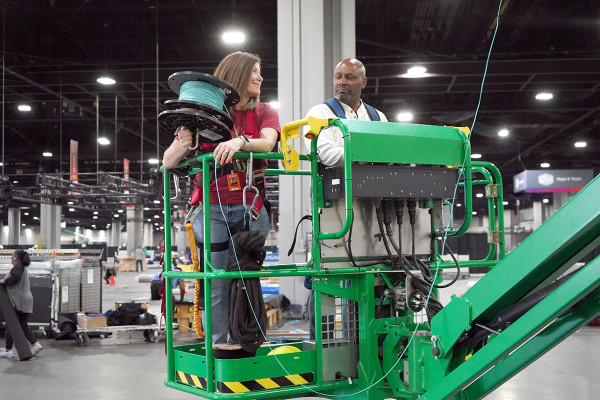
SC24 SCinet Chair and WINS alum Angie Asmus helps deploy aerial optical fiber to an exhibitor booth.
“You have to see it to be it,” tennis champion Billie Jean King famously said. This simple statement has become a rallying cry for improving representation not just in sports, but in multiple occupations and disciplines.
Nine years after the Women in IT Networking at SC (WINS) program was first piloted in 2015 to increase gender diversity in the research and education (R&E) community’s ranks of network and computer systems engineers, women remain a tiny minority in these skilled, well-paying careers. Just 9.4% of network engineers and 13.2% of computer systems engineers are women. This is why WINS has been both game-changing — and life-changing — for its 56 participants.
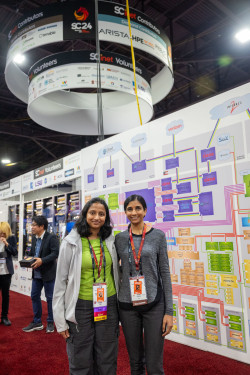
Left: WINS awardee Sahana Aswathanarayan and ESnet WINS Team Co-Chair Fatema Bannat-Wala at SC24
“I’ve only worked with men in networking until now,” says 2024 WINS awardee Sahana Aswathanarayan, a network engineer with the National Renewable Energy Laboratory. “It was shocking to know there are so many women in networking! It’s been amazing to be around all these brilliant women at SC24. They’ve been so encouraging.”
Seeing it is one thing, being it is the next step. “I live in a very rural area in Colorado. Meeting women at SC who were focused on their careers and had really impressive goals, having this group of female professional contacts, has been huge for me,” explains Kate Robinson, a 2017 WINS alum who indirectly landed her current role as a network engineer in ESnet’s Optical Network group, through WINS. She is now ESnet’s WINS Director, alongside WINS alum and Indiana University WINS Program Director Brenna Meade.
A WINning Proposal
WINS was officially launched in 2016 by the University Corporation for Atmospheric Research (UCAR), the Keystone Initiative for Network Based Education and Research (KINBER), and the Department of Energy’s Energy Science Network (ESnet), funded through a grant from the National Science Foundation (NSF) and directly by ESnet. Today, WINS is a joint effort between UCAR, ESnet, the American Indian Higher Education Consortium, and Indiana University. Financial support for the WINS program has come from a combination of the original joint partners as well as a number of sponsors at every level, who fund everything from travel expenses for participants to sponsoring networking events.
From the start, WINS’ primary goal has been to enable five to seven early to mid-career women in the R&E network community to participate in the setup, build-out, and live operation of SCinet. Designed over many months and constructed in a few weeks by an army of volunteers, SCinet is the “world’s fastest temporary network.” It serves as a testbed for leading-edge technologies and computing demonstrations as well as the production network infrastructure at the International Conference on High Performance Computing, Networking, Storage, and Analysis, known as SC.
In WINS’ first year, 2015, fewer than 14% of SCinet volunteers were women. Since then, that percentage has tripled, and the number of women holding leadership roles in SCinet’s many teams has also steadily increased. The 56 WINS participants have come from diverse backgrounds, traveling to SC from 25 states from home institutions that include community colleges, tribal school systems, DOE national labs, global R&E networks, and for-profit organizations.
More importantly for career development and networking, nearly half of WINS alumni have returned to SC — and more than a dozen of them have played leadership roles, often multiple times. ESnet’s Robinson, for example, was the Technical Director of SCinet in 2023, which was her fifth leadership position.
One of WINS’ biggest success stories is Angie Asmus, who is the SC24 SCinet Chair — the top position, overseeing nearly 200 volunteers. Asmus was working in Colorado State University’s Information Technology division when she won a 2016 WINS scholarship. At SC16, she learned to configure network switches and set up wireless access points. By 2019 she was the Edge Team’s lead, then its chair, and then was elected SCinet chair in 2023. At Colorado State, she now manages 20 full-time employees as Director of Network and Telecommunications.
“WINS changed my life,” Asmus said at an SC24 lunch for WINS awardees, alumni, and sponsors. “It gave me both soft skills and tech skills, as well as the confidence and experience to rise through the ranks in my career.”
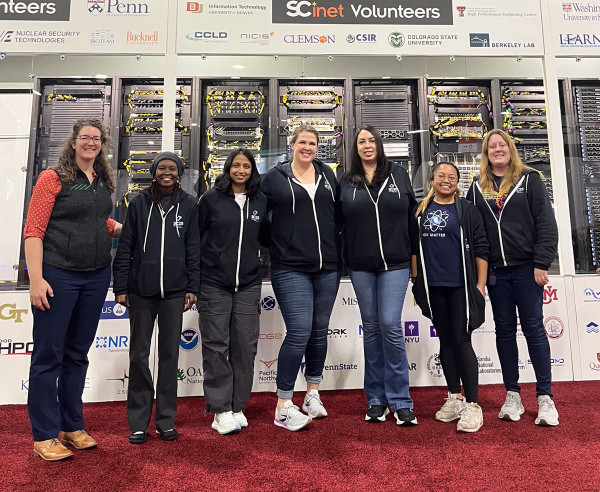
Left to right: ESnet WINS Director Kate Robinson (ESnet, WINS alum); WINS SC24 awardees Danielle Southerland (University of Pennsylvania, SCinet Routing); Sahana Aswathanarayan (NREL, SCinet Edge), Rebecca Kingery (State of Nebraska Office of the CIO, SCinet Communications), Drew Lasson (University of Utah, SCinet Fiber), and Sunshine Balingit (LLNL, SCinet DevOps); and WINS Program Director Brenna Meade (Indiana University, Technical Director of SCinet, and WINS alum).
Fighting Imposter Syndrome at SC24
ESnet Network Security Engineer Fatema Bannat-Wala first applied to WINS as a University of Delaware student in 2018. “I was so heartbroken when I was rejected,” she recalls.
Bannat-Wala served as a WINS Team Co-Chair for SC24, working with the WINS management team for months before the show began to make sure that Aswathanarayan and the other 2024 WINS women had everything they needed to contribute to and learn from their various SCinet teams. WINS had an in-person meeting in April in Texas, so that all WINS participants could meet their teams, followed by virtual meetings in the runup to SC in November. (ESnet fully funded the travel and other expenses of three of the five WINS awardees; a sixth had to withdraw for work obligations.)
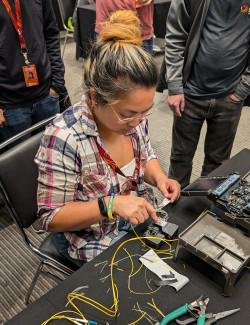
WINS awardee Sunshine Balingit, a SCinet DevOps team member and Lawrence Livermore National Laboratory security system administrator, practices splicing optical fiber.
Being able to be both a mentor and a participant in WINS was “a dream come true” for Bannat-Wala: “Giving women the chance to be in the network – but also show other women that they can BE you. These women are just starting to see themselves in these careers, like security and optical. The biggest problem is the perspective that these are men-led fields. Women have imposter syndrome. WINS gives them a secure space filled with strong women who can relate to them and empower them. You don’t have to have experience. We say, ‘If you’re interested, we can teach you.’”
For Aswathanarayan, the scale of SC24 and SCinet in Atlanta were both mind-blowing. She served on the Edge Network team, helping to install the 450 wireless access points and 210 switches that dotted the massive convention center. “I had some wireless experience, but I wanted to learn more, and I have,” she says. “My team lead, he’s amazing — he’s automated everything.”
And of course, Aswathanarayan has also gained networking experience of the relationship kind: “Fatema [Bannat-Wala] has been really helpful. I just met her and now we’re good friends.” While talking to fellow WINS awardee Sunshine Balingit, Aswathanarayan expressed interest in learning Ansible. “She introduced me to one of her Dev Ops teammates who’s doing something related, and next year I might get to do DevOps IPv6! I would love to come back if I can. There’s so much more I can learn.”
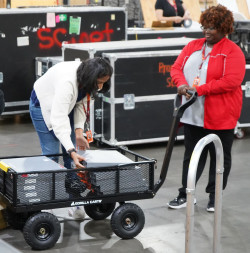
Aswathanarayan loads wireless access point technology for installation on the show floor
“Everyone was patient and willing to teach or help, even through all the chaos,” echoes Balingit, a security system administrator at Lawrence Livermore National Laboratory. “This experience has given me insight into where I stand in my career, who I am as a person, and that I belong. To see folks from around the world come together to make this giant pop-up happen — and seeing a higher percentage of women than I’m used to — has been awe-inspiring.”
For ESnet, which sends 10-15 volunteers every year to work on SCinet, funding and helping to keep WINS running is a winning proposition.
“It's been wonderful to see the network of women in SCinet grow in numbers and power over the years due to programs like WINS,” says SCinet Executive Advisor Jason Zurawski, part of the original ESnet team that helped found WINS (who were honored in 2017 with a CENIC Innovations in Networking Award for Experimental Applications). “Cyberinfrastructure, like any field, is strengthened by the contributions of people with different perspectives and experiences. We’ve seen the benefits of WINS over the years at SCinet as well as at ESnet. We are proud to support WINS.”
Applications opened Dec. 2 for the SC25 WINS cohort. For more details and the link to apply, visit the WINS website.
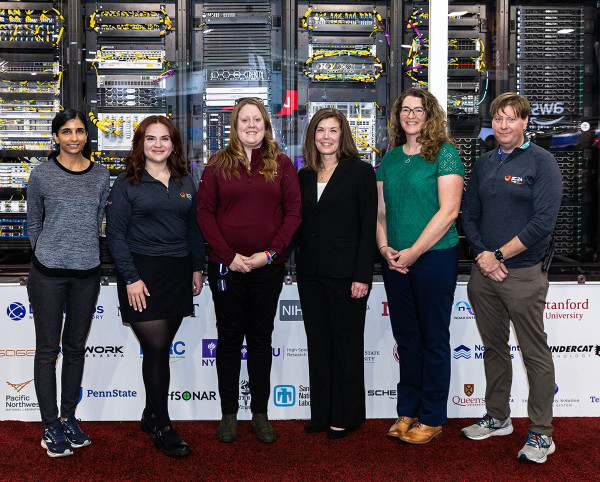
SC24 WINS leadership, left to right: WINS Team Co-Lead Fatema Bannat-Wala (ESnet), WINS Co-Lead and DevOps Team Member Karen Lopez (NREL, WINS alum), WINS Program Director Brenna Meade (Indiana University, WINS alum), SCinet Chair Angie Asmus (Colorado State University, WINS alum); ESnet WINS Director Kate Robinson (ESnet, WINS alum); and SCinet Executive Adviser Jason Zurawski (ESnet WINS cofounder).

